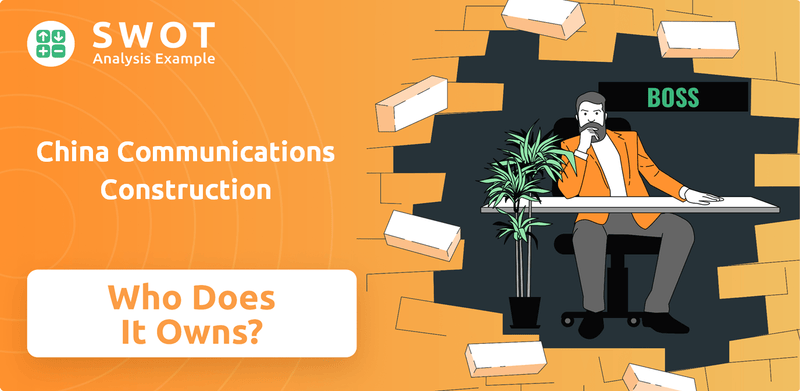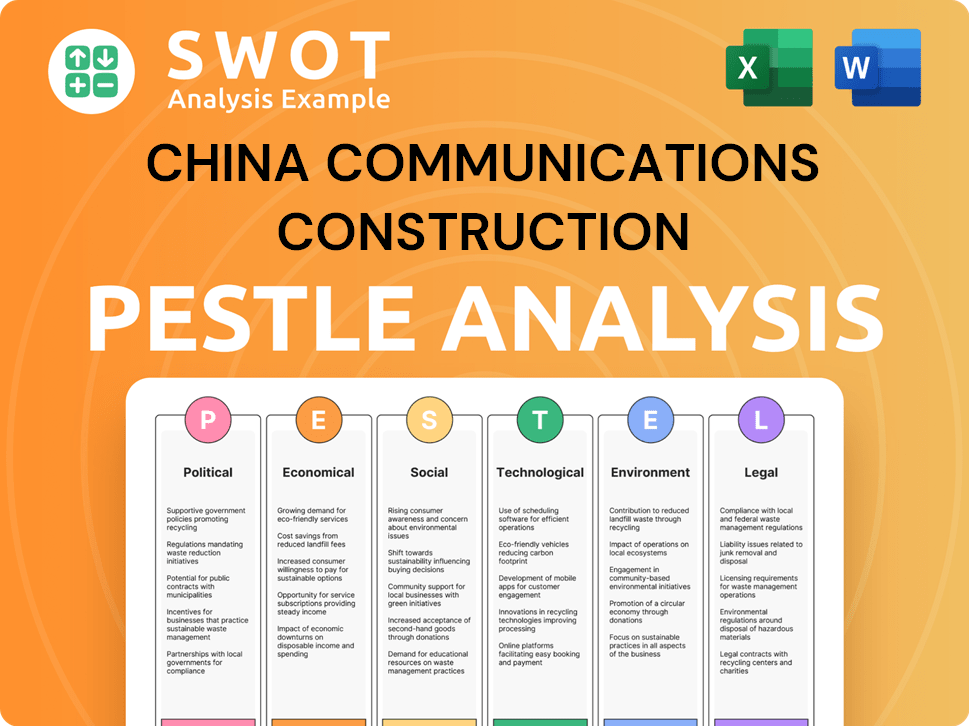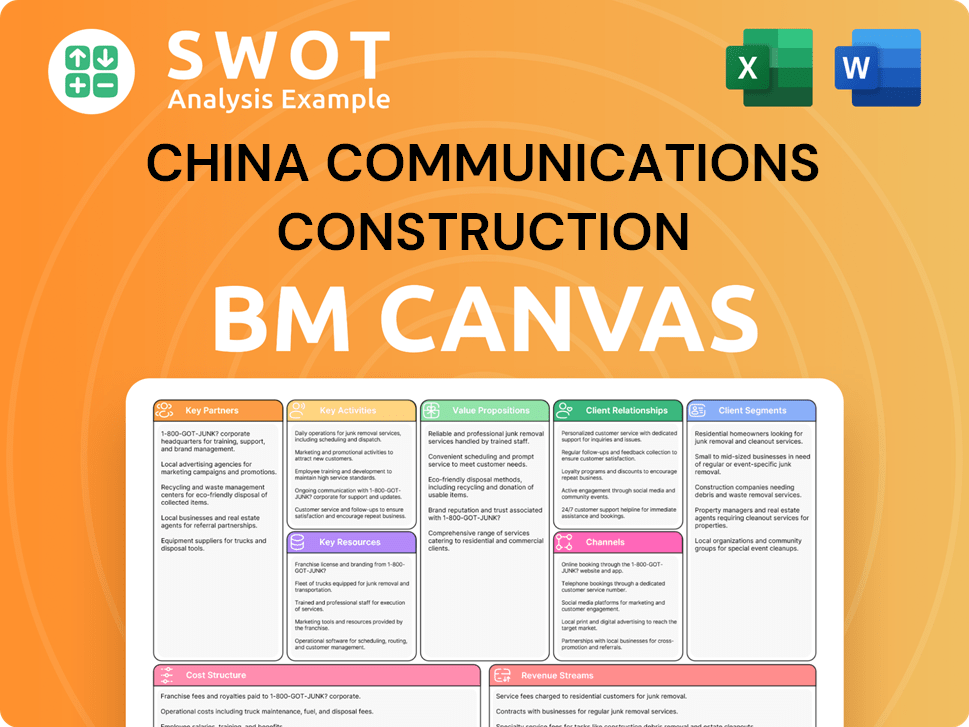China Communications Construction Bundle
Who Really Controls China Communications Construction Company?
Understanding the ownership structure of a global giant like China Communications Construction Company (CCCC) is crucial for investors and strategists alike. From its roots as a state-owned enterprise to its current status as a publicly traded entity, the evolution of CCCC's ownership has significantly shaped its trajectory. This exploration unveils the key players and influences behind one of the world's largest infrastructure companies.

The shift from a wholly state-owned entity to a publicly listed company, with listings on both the Hong Kong and Shanghai Stock Exchanges, marks a pivotal moment in CCCC's history. This transformation has implications for its strategic direction, governance, and accountability, impacting everything from its China Communications Construction SWOT Analysis to its global project portfolio. Discover the intricacies of CCCC ownership and its impact on this infrastructure behemoth, including its parent company and major shareholders.
Who Founded China Communications Construction?
The China Communications Construction Company (CCCC) did not originate from individual founders in the traditional sense. Instead, it was established through a strategic merger and reorganization of two state-owned enterprises: China Harbour Engineering (Group) Company (CHEC) and China Road and Bridge Corporation (CRBC). This restructuring formed China Communications Construction Group (CCCG), which then founded CCCC.
This consolidation occurred on December 18, 2005, with the creation of CCCG. Subsequently, CCCC was officially established on October 8, 2006. The initial ownership of CCCC was entirely held by CCCG, a central enterprise overseen by the State-owned Assets Supervision and Administration Commission of the State Council (SASAC).
From its inception, CCCC operated as a state-owned enterprise (SOE). There were no individual founders with equity stakes or angel investors typical of private startups. The initial capital comprised 10.8 billion shares, all under the control of CCCG. The primary focus, inherited from CHEC and CRBC, was transportation and marine infrastructure, which CCCC expanded to become a comprehensive infrastructure service provider. To understand more about the company's target market, you can read the article on the Target Market of China Communications Construction.
The CCCC ownership structure is primarily controlled by the Chinese government through CCCG and SASAC. As a state-owned enterprise, the ultimate owner of China Communications Construction Company is the state itself.
- CCCG held 100% of CCCC's shares initially.
- The governance of CCCC is centralized under CCCG and the Chinese government.
- There are no significant individual shareholders outside of the state control.
- CCCC is a publicly traded company, but the majority of shares are controlled by the state.
China Communications Construction SWOT Analysis
- Complete SWOT Breakdown
- Fully Customizable
- Editable in Excel & Word
- Professional Formatting
- Investor-Ready Format

How Has China Communications Construction’s Ownership Changed Over Time?
The ownership of China Communications Construction Company (CCCC) has evolved significantly since its inception. Initially, the company was entirely owned by China Communications Construction Group (CCCG), a state-owned enterprise under the supervision of the State-owned Assets Supervision and Administration Commission of the State Council (SASAC). A pivotal moment in CCCC's ownership structure was its initial public offering (IPO) on the Hong Kong Stock Exchange on December 15, 2006, followed by an A-share listing on the Shanghai Stock Exchange on March 9, 2012, which brought in public shareholders and diversified its ownership.
These listings marked CCCC's transition into the public market, introducing a mix of institutional and individual investors alongside the existing state ownership. The evolution of CCCC's ownership reflects its growth and integration into global financial markets, while still maintaining a strong connection to the Chinese government. This structure allows CCCC to balance market-driven governance with strategic alignment with national objectives, particularly in major infrastructure projects.
| Ownership Milestone | Date | Impact |
|---|---|---|
| Initial Ownership | Pre-2006 | Wholly owned by CCCG, a state-owned enterprise. |
| Hong Kong IPO | December 15, 2006 | Entry into the overseas capital market, introduction of public shareholders. |
| Shanghai A-Share Listing | March 9, 2012 | Further diversification of ownership, increased access to capital. |
| Recent Ownership Structure | November 30, 2024 | CCCG and other private companies held 60% of shares, individual investors held 34%. |
As of November 30, 2024, the ownership structure of CCCC shows a significant presence of private entities, primarily China Communications Construction Group (Ltd.), holding approximately 60% of the shares, with CCCG alone holding 59%. Individual investors hold a substantial 34% stake. Institutional investors also play a role, with institutional ownership for its Shanghai-listed shares at 2.00% as of May 30, 2025. This balance between state ownership, institutional investors, and public shareholders shapes the governance and strategic direction of CCCC. The Brief History of China Communications Construction provides additional context on the company's evolution.
The ownership of China Communications Construction Company (CCCC) is primarily influenced by the Chinese government, ensuring strategic alignment.
- CCCG, a state-owned enterprise, holds a significant portion of CCCC's shares.
- Public listings on the Hong Kong and Shanghai stock exchanges have diversified the shareholder base.
- Institutional and individual investors also hold substantial stakes in the company.
- The ownership structure supports CCCC's involvement in major infrastructure projects.
China Communications Construction PESTLE Analysis
- Covers All 6 PESTLE Categories
- No Research Needed – Save Hours of Work
- Built by Experts, Trusted by Consultants
- Instant Download, Ready to Use
- 100% Editable, Fully Customizable

Who Sits on China Communications Construction’s Board?
The current board of directors of China Communications Construction Company (CCCC) plays a critical role in the company's governance. The board operates under the significant influence of its major shareholder, China Communications Construction Group (CCCG), a state-owned enterprise. As of early 2024, Wang Yong Bin serves as the Chairman of the board, appointed on November 17, 2021. Hai Huai Wang is the President, appointed on April 6, 2021. Zheng Chang Liu is the Director of Finance/CFO, appointed on January 25, 2024. The board's composition includes various directors, some of whom likely represent the interests of CCCG, given its majority ownership. As of October 25, 2024, directors included Wang Tongzhou, Wang Haihuai, Liu Xiang, Liu Hui, Chan Wing Tak Kevin, Wu Guangqi, and Zhou Xiaowen.
This board structure reflects the influence of the parent company, ensuring alignment with the strategic objectives of CCCG. The board's decisions are therefore closely tied to the overarching goals of the state-owned enterprise. Understanding the composition of the board is essential for grasping the dynamics of CCCC ownership and how decisions are made within the company. The board's leadership and the influence of the parent company are key factors in the governance of China Communications Construction Company.
| Position | Name | Appointment Date |
|---|---|---|
| Chairman | Wang Yong Bin | November 17, 2021 |
| President | Hai Huai Wang | April 6, 2021 |
| Director of Finance/CFO | Zheng Chang Liu | January 25, 2024 |
The voting structure of CCCC is primarily influenced by the substantial stake held by CCCG. As of April 18, 2025, private companies, with China Communications Construction Group (Ltd.) as the largest shareholder, held 59% of the ownership, indicating significant control over the company's future. This large stake suggests that key decisions and strategic directions are heavily influenced by the state-owned parent entity. While individual investors hold a 34% stake, this group's influence is generally less direct in policy decisions compared to the dominant private company ownership. There is no information readily available to suggest the presence of dual-class shares, special voting rights, or golden shares that would grant disproportionate control to specific individuals or entities beyond the primary state ownership. Recent corporate governance reports and announcements, such as the 2024 Annual Report, do not highlight any major proxy battles or activist investor campaigns, reinforcing the stable, state-controlled governance model. Understanding the ownership structure is crucial to answering the question of who owns CCCC.
The ownership structure of China Communications Construction Company (CCCC) is dominated by its parent company, China Communications Construction Group (CCCG).
- CCCG, a state-owned enterprise, holds a significant majority stake.
- Individual investors hold a smaller percentage of shares.
- The board of directors is heavily influenced by the parent company.
- Key decisions and strategic directions are primarily influenced by the state-owned parent entity.
China Communications Construction Business Model Canvas
- Complete 9-Block Business Model Canvas
- Effortlessly Communicate Your Business Strategy
- Investor-Ready BMC Format
- 100% Editable and Customizable
- Clear and Structured Layout

What Recent Changes Have Shaped China Communications Construction’s Ownership Landscape?
Over the past few years, China Communications Construction Company (CCCC) has seen developments primarily focused on internal adjustments and share repurchases. In May 2025, CCCC announced a share repurchase program, planning to buy back shares valued between CNY 0.5 billion and CNY 1 billion. These repurchases, which could involve between 45.45 million and 90.91 million shares (0.28% to 0.56% of the total), are intended to reduce the company's registered capital. This move aims to boost shareholder confidence and protect their interests. Additionally, in June 2025, CCCC cancelled 4,117,200 restricted shares under its 2022 Restricted Share Incentive Scheme due to changes in participant status.
In terms of strategic moves, CCCC acquired a 23% stake in Mota-Engil, SGPS, S.A., a Portuguese construction firm, for approximately €170 million on November 27, 2020. This investment was aimed at expanding CCCC's presence in Europe, Africa, and Latin America. A significant internal adjustment involved the free transfer of CWE Ltd., focusing on clean energy and hydropower construction, to CCCC in the first half of 2023. This transfer is expected to strengthen CCCC's clean energy business significantly.
| Development | Details | Date |
|---|---|---|
| Share Repurchase Program | Buyback of shares worth CNY 0.5 billion to CNY 1 billion | May 2025 |
| Share Cancellation | Cancellation of 4,117,200 restricted shares | June 13, 2025 |
| Acquisition | Acquisition of a 23% stake in Mota-Engil, SGPS, S.A. | November 27, 2020 |
| Internal Transfer | Free transfer of CWE Ltd. to CCCC | First half of 2023 |
The ownership structure of CCCC remains heavily influenced by state-owned entities. China Communications Construction Group (CCCG) continues to be the largest shareholder, holding approximately 59.4% of CCCC as of early 2025. This significant state ownership provides stability and aligns the company with national strategic goals, such as the Belt and Road Initiative. Institutional ownership is a smaller portion, with Shanghai-listed shares at 2.00% as of May 30, 2025. There are no public indications of plans for privatization or a major shift in the controlling state ownership in the near future, with the company focusing on high-quality development and achieving '14th Five-Year Plan' objectives by 2025.
China Communications Construction Group (CCCG) holds approximately 59.4% of CCCC's shares, serving as the primary shareholder.
CCCC announced a share repurchase program in May 2025, planning to buy back shares worth between CNY 0.5 billion and CNY 1 billion.
Institutional ownership for Shanghai-listed shares was at 2.00% as of May 30, 2025.
CCCC acquired a 23% stake in Mota-Engil, SGPS, S.A., to expand its global footprint.
China Communications Construction Porter's Five Forces Analysis
- Covers All 5 Competitive Forces in Detail
- Structured for Consultants, Students, and Founders
- 100% Editable in Microsoft Word & Excel
- Instant Digital Download – Use Immediately
- Compatible with Mac & PC – Fully Unlocked

Related Blogs
- What are Mission Vision & Core Values of China Communications Construction Company?
- What is Competitive Landscape of China Communications Construction Company?
- What is Growth Strategy and Future Prospects of China Communications Construction Company?
- How Does China Communications Construction Company Work?
- What is Sales and Marketing Strategy of China Communications Construction Company?
- What is Brief History of China Communications Construction Company?
- What is Customer Demographics and Target Market of China Communications Construction Company?
Disclaimer
All information, articles, and product details provided on this website are for general informational and educational purposes only. We do not claim any ownership over, nor do we intend to infringe upon, any trademarks, copyrights, logos, brand names, or other intellectual property mentioned or depicted on this site. Such intellectual property remains the property of its respective owners, and any references here are made solely for identification or informational purposes, without implying any affiliation, endorsement, or partnership.
We make no representations or warranties, express or implied, regarding the accuracy, completeness, or suitability of any content or products presented. Nothing on this website should be construed as legal, tax, investment, financial, medical, or other professional advice. In addition, no part of this site—including articles or product references—constitutes a solicitation, recommendation, endorsement, advertisement, or offer to buy or sell any securities, franchises, or other financial instruments, particularly in jurisdictions where such activity would be unlawful.
All content is of a general nature and may not address the specific circumstances of any individual or entity. It is not a substitute for professional advice or services. Any actions you take based on the information provided here are strictly at your own risk. You accept full responsibility for any decisions or outcomes arising from your use of this website and agree to release us from any liability in connection with your use of, or reliance upon, the content or products found herein.